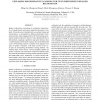97 search results - page 19 / 20 » Identity Based Public Verifiable Signcryption Scheme |
CCS
2005
ACM
13 years 11 months ago
2005
ACM
We describe a new encryption technique that is secure in the standard model against adaptive chosen ciphertext (CCA2) attacks. We base our method on two very efficient Identity-Ba...
ICMCS
2007
IEEE
13 years 11 months ago
2007
IEEE
Speaker verification is a technology of verifying the claimed identity of a speaker based on the speech signal from the speaker (voice print). To learn the score of similarity be...
ACSAC
2006
IEEE
13 years 11 months ago
2006
IEEE
Sensor networks are deployed to monitor the physical environment in public and vulnerable locations. It is not economically viable to house sensors in tamper-resilient enclosures ...
TIP
2010
13 years 6 days ago
2010
Copyright protection is a key issue for video sharing over public networks. To protect the video content from unauthorized redistribution, digital fingerprinting is commonly used. ...
EUROCRYPT
2009
Springer
14 years 6 months ago
2009
Springer
A group key agreement (GKA) protocol allows a set of users to establish a common secret via open networks. Observing that a major goal of GKAs for most applications is to establish...

